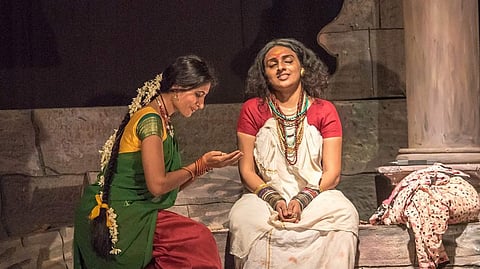

THIRUVANANTHAPURAM: Her affection could easily be termed irrational by those looking for logic in matters of the heart. But Chellamma’s love for Chithira Thirunal Balarama Varma, the last ruler of erstwhile Travancore, though unrequited, endured the onslaughts of time. Old-timers in the city still remember her story.
Clad in artificial finery, Chellamma, who lived on the streets of East Fort, fixed her eyes on the road forever in search of her beloved king.
As a beautiful, young woman (which earned her the name Sundari Chellamma), she had seen Chithira Thirunal pass by in a car; a stately young man with divinely restful charm. It may have been love at first glance for her, but what caused the change was her first (and probably the last) meeting with him face-to-face.
She was a teacher of Thiruvathira at the Cotton Hill School when given a role in a play that the Chithira Thirunal Library staged. “The play was an annual event held during the birthday of the king,” says historian M G Sashibhooshan.
After the play, the king felicitated her and others with ponnada (a shawl of honour). That piece of cloth changed her life; her deeply emotional mind believed that the cloth was indeed the pudava (ceremonial dress given by the groom to the bride to solemnise the marriage) given to her by the king.
From then on, she bore herself as Chithira Thirunal’s “ammachi” as the consort of the king is called. “We have seen Chellamma standing near the palace gates waiting to catch a glimpse of the king. The moment she would see the king, a beaming tranquillity would fill her face,” says Sasibhooshan.
This love made Chellamma go through rough patches. She could not commit herself to her job and had to quit.
She was taken to psychiatrists but refused any treatment. She left home and made the Thekke Theruvu at the East Fort area her place of stay. Here, she would stand dressed up in silk-laced neryathu-mundu and imitation jewellery to offer respects to the king every day when he came to worship at the Sree Padmanabhaswamy temple.
Times passed, she advanced in age and so did her king, yet Chellamma’s routine remained the same. She had to be present every day by the street to see and greet him.
A small pension was allowed for her, which may have made things a tad better. Yet she lived on the street amid all its travails but fully oblivious to them.
Later, poet Sugathakumari wanted to take her to ‘Abhaya’, but Chellamma chose to be at East Fort rather than in the destitute home. Because only then, she could see her king every day.
Chellama passed away shortly after Chithira Thirunal died in 1991. It is said that even when the end came, she had the worn-out clutch held close to her, which had in it the ‘pudava’ that made her live for love.
According to an interview with Aswathy Thirunal Gowri Lakshmi Bai, niece of Chithira Thirunal, featured in a documentary, Chellamma’s death was a moving end to a tragic story. There were media reports about her death, and many followed with their accounts of her life.
The play 'Rani Ammachi' was scripted by playwright B Narendraprasad, who was one of the many for whom she was a regular sight on East Fort Street. The play was staged in 2016, after Narendraprasad’s death.
Rudra Lal, who played Chellamma in the play, says, “The role was challenging, as it was of a woman in her 60s who had the passion and depth of feelings of a very young woman.”
It is hard for the world to comprehend how anyone could be in such a guileless, devotional love for a lifetime.
To Chellamma, the honesty of her feelings or acceptance did not matter. What did was that she should be able to see her love every day. Nothing more, nothing less.